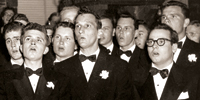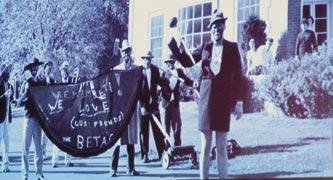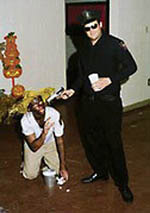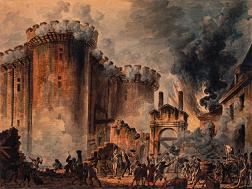The Gift of Reading
Happy Christmas, everyone. Here’s some holiday reading, as a gift from me to you. World War I may not seem like the best topic for the season, but, well, that’s what I’ve been working on lately.
At Dulce Et Decorum Est today, you can read a powerful review essay by Phil Shannon, on the Soldier’s Truce of Christmas, 1914 (which I first encountered a year ago, through Kevin Carson’s blog.)
It was the war that was supposed
to be over by Christmas
. It very nearly was. A spontaneous soldiers’ truce broke out along the Western Front on Christmas Eve 1914, four months after the start of hostilities.Peace on Earth
,goodwill to all men
— British, French and German soldiers took these usually hypocritical Christmas sentiments for real and refused to fire on theenemy
, exchanging instead song, food, drink and gifts with each other in the battle-churned wastes ofno-man’s land
between the trenches.Lasting until Boxing Day in some cases, the truce alarmed the military authorities who worked overtime to end the fraternisation and restart the killing.
Stanley Weintraub’s haunting book on the
Christmas Truce
recounts through the letters of the soldiers the extraordinary event, routinely denigrated in orthodox military histories asan aberration of no consequence
, but which was, argues Weintraub, not only a temporary respite from slaughter but an event which had the potential to topple death-dealing governments.Some time ago, I put up a copy of Randolph Bourne’s most famous essay, The State, online at the Fair Use Repository. Lots of people had already posted extracts from The State online in all kinds of different forums (usually under the title
War is the Health of the State
). But as far as I know the Fair Use edition is the only complete online transcription. (The others usually omit Part II, Bourne’s analysis of American politics and the party system.)In any case, the more topical news is that I’ve just added two more of Bourne’s essays on the war — essays which, unlike The State, were published within Bourne’s own lifetime. These both come from his time writing for Seven Arts: The War and the Intellectuals is from June, 1917, and A War Diary is from September, 1917. Unfortunately what was true of the Sensible Liberals and New Republic columnists of 1917 could just as easily have been written last week.
The results of war on the intellectual class are already apparent. Their thought becomes little more than a description and justification of what is already going on. They turn upon any rash one who continues idly to speculate. Once the war is on, the conviction spreads that individual thought is helpless, that the only way one can count is as a cog in the great wheel. There is no good holding back. We are told to dry our unnoticed and ineffective tears and plunge into the great work. Not only is everyone forced into line, but the new certitude becomes idealized. It is a noble realism which opposes itself to futile obstruction and the cowardly refusal to face facts. This realistic boast is so loud and sonorous that one wonders whether realism is always a stern and intelligent grappling with realities. May it not be sometimes a mere surrender to the actual, an abdication of the ideal through a sheer fatigue from intellectual suspense? The pacifist is roundly scolded for refusing to face the facts, and for retiring into his own world of sentimental desire. But is the realist, who refuses to challenge or to criticise facts, entitled to any more credit than that which comes from following the line of least resistance? The realist thinks he at least can control events by linking himself to the forces that are moving. Perhaps he can. But if it is a question of controlling war, it is difficult to see how the child on the back of a mad elephant is to be any more effective in stopping the beast than is the child who tries to stop him from the ground. The ex-humanitarian, turned realist, sneers at the snobbish neutrality, colossal conceit, crooked thinking, dazed sensibilities, of those who are still unable to find any balm of consolation for this war. We manufacture consolations here in America while there are probably not a dozen men fighting in Europe who did not long ago give up every reason for their being there except that nobody knew how to get them away.
And:
The penalty the realist pays for accepting war is to see disappear one by one the justifications for accepting it. He must either become a genuine Realpolitiker and brazen it through, or else he must feel sorry for his intuition and be regretful that he willed the war. But so easy is forgetting and so slow the change of events that he is more likely to ignore the collapse of his case. If he finds that his government is relinquishing the crucial moves of that strategy for which he was willing to use the technique of war, he is likely to move easily to the ground that it will all come out in the end the same anyway. He soon becomes satisfied with tacitly ratifying whatever happens, or at least straining to find the grain of unplausible hope that may be latent in the situation.
But what then is there really to choose between the realist who accepts evil in order to manipulate it to a great end, but who somehow unaccountably finds events turn sour on him, and the Utopian pacifist who cannot stomach the evil and will have none of it? Both are helpless, both are coerced. The Utopian, however, knows that he is ineffective and that he is coerced, while the realist, evading disillusionment, moves in a twilight zone of half-hearted criticism and hoping for the best, where he does not become a tacit fatalist. The latter would be the manlier position, but then where would be his realistic philosophy of intelligence and choice? Professor Dewey has become impatient at the merely good and merely conscientious objectors to war who do not attach their conscience and intelligence to forces moving in another direction. But in wartime there are literally no valid forces moving in another direction. War determines its own end–victory, and government crushes out automatically all forces that deflect, or threaten to deflect, energy from the path of organization to that end. All governments will act in this way, the most democratic as well as the most autocratic. It is only
liberal
naïveté that is shocked at arbitrary coercion and suppression. Willing war means willing all the evils that are organically bound up with it. A good many people still seem to believe in a peculiar kind of democratic and antiseptic war. The pacifists opposed the war because they knew this was an illusion, and because of the myriad hurts they knew war would do the promise of democracy at home. For once the babes and sucklings seem to have been wiser than the children of light.Third, I’ve also added a series of essays from 1915, which I discovered thanks to Carl Watner’s essay on nonviolent resistance in the most recent Journal of Libertarian Studies. The exchange began with Bertrand Russell’s The Ethics of War, which appeared in the January 1915 number of the International Journal of Ethics. Russell condemned the war and argued
If the facts were understood, wars amongst civilized nations would case, owing to their inherent absurdity.
(Meanwhile, in one of the more baffling parts of the essay, he did some utilitarian hand-waving to try to offer some rather despicable excuses for wars of colonization and the attendant ethnic cleansing. As usual, good anti-war instincts are betrayed by prejudice when utilitarian pseudo-calculations are allowed to intrude.) Ralph Barton Perry objected to Russell’s criticism, at least as applied to the ongoing war, in Non-Resistance and the Present War. Russell wrote two more articles. One of them a direct rejoinder to Perry, published as The War and Non-Resistance–A Rejoinder to Professor Perry in the IJE. The other, probably the best essay in the exchange, appeared in the Atlantic Monthly, under the title War and Non-Resistance. Of particular note is Section II, in which Russell considers how Britain might be defended from a foreign invasion with no army and no navy, using only the methods of non-violent passive resistance. Although Russell doesn’t quite realize it, the answer he offers amounts, in the end, to doing away with the central State and its organized machinery. With no levers of centralized power to take hold of, the invaders would find themselves in possession of little if anything. Anyway, it’s well worth a read.
Read, and enjoy.
May your holidays be full of light and warmth, joy in fellowship, comfort, and peace.








 There aren’t many so-called
There aren’t many so-called